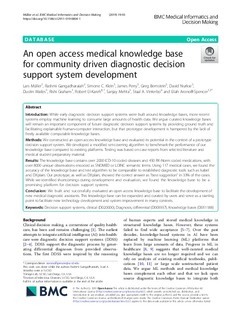An open access medical knowledge base for community driven diagnostic decision support system development
Müller, Lars; Gangadharaiah, Rashmi; Klein, Simone; Perry, James; Bernstein, Greg; Nurkse, David; Wailes, Dustin; Graham, Rishi; El-Kareh, Robert; Mehta, Sanjay; Vinterbo, Staal; Aronoff-Spencer, Eliah
Journal article, Peer reviewed
Published version

Åpne
Permanent lenke
http://hdl.handle.net/11250/2636389Utgivelsesdato
2019Metadata
Vis full innførselSamlinger
Originalversjon
10.1186/s12911-019-0804-1Sammendrag
Introduction
While early diagnostic decision support systems were built around knowledge bases, more recent systems employ machine learning to consume large amounts of health data. We argue curated knowledge bases will remain an important component of future diagnostic decision support systems by providing ground truth and facilitating explainable human-computer interaction, but that prototype development is hampered by the lack of freely available computable knowledge bases.
Methods
We constructed an open access knowledge base and evaluated its potential in the context of a prototype decision support system. We developed a modified set-covering algorithm to benchmark the performance of our knowledge base compared to existing platforms. Testing was based on case reports from selected literature and medical student preparatory material.
Results
The knowledge base contains over 2000 ICD-10 coded diseases and 450 RX-Norm coded medications, with over 8000 unique observations encoded as SNOMED or LOINC semantic terms. Using 117 medical cases, we found the accuracy of the knowledge base and test algorithm to be comparable to established diagnostic tools such as Isabel and DXplain. Our prototype, as well as DXplain, showed the correct answer as “best suggestion” in 33% of the cases. While we identified shortcomings during development and evaluation, we found the knowledge base to be a promising platform for decision support systems.
Conclusion
We built and successfully evaluated an open access knowledge base to facilitate the development of new medical diagnostic assistants. This knowledge base can be expanded and curated by users and serve as a starting point to facilitate new technology development and system improvement in many contexts.
